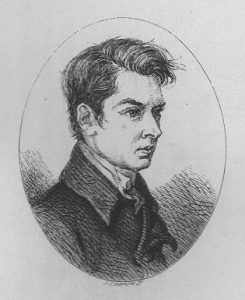
Early Life of Hazlitt
Hazlitt’s childhood was spent in Ireland and North America. The family returned to English when he was nine. But during puberty, Hazlitt became sullen and unapproachable, acquiring tendencies that persisted throughout his life. However, he enjoyed reading, which laid the foundation of his learning. Hazlitt had an affinity for painting, which he found was a better way to express his thoughts. In 1802, he traveled to Paris to work in the Louvre, but had to come back because of the war between England and France.
Writing Career of William Hazlitt
His friends, which included S T Coleridge, Charles Lamb and William Wordsworth, encouraged him as a painter. In 1805 however, he turned to metaphysics and philosophy and published his first book, On the Principles of Human Action.
After his first marriage in 1808 to Sarah Stoddart, the couple went to live at Winterslow on Salisbury Plain. This place became Hazlitt’s favourite writing retreat for the rest of his life. Even though he had several successful literary projects to his name, Hazlitt was penniless by the end of 1811. He then gave a course of lectures in philosophy in London and began reporting for the Morning Chronicle. This position rapidly secured his position as a distinguished critic, journalist, and essayist. He also contributed to a number of journals. He became known as a reknowned lecturer, delivering courses On the English Poets and On the English Comic Writers , and published a collection of political essays.
Hazlitt had a troubled marital life, which forced him to live apart from his wife after the end of 1819, and soon enough they were divorced in 1822. Inspite of this, many of his best essays were written during this time and were collected in his two most famous books: Table Talk and The Plain Speaker. His other works during this period of included Sketches of the Principal Picture Galleries in England.
In April 1824, Hazlitt married a widow named Bridgwater. But due to differences between his son and his new wife, the couple had to separate after three years of marriage. He lived a part of this second marriage outside of England, which he recorded in Notes of a Journey in France and Italy.